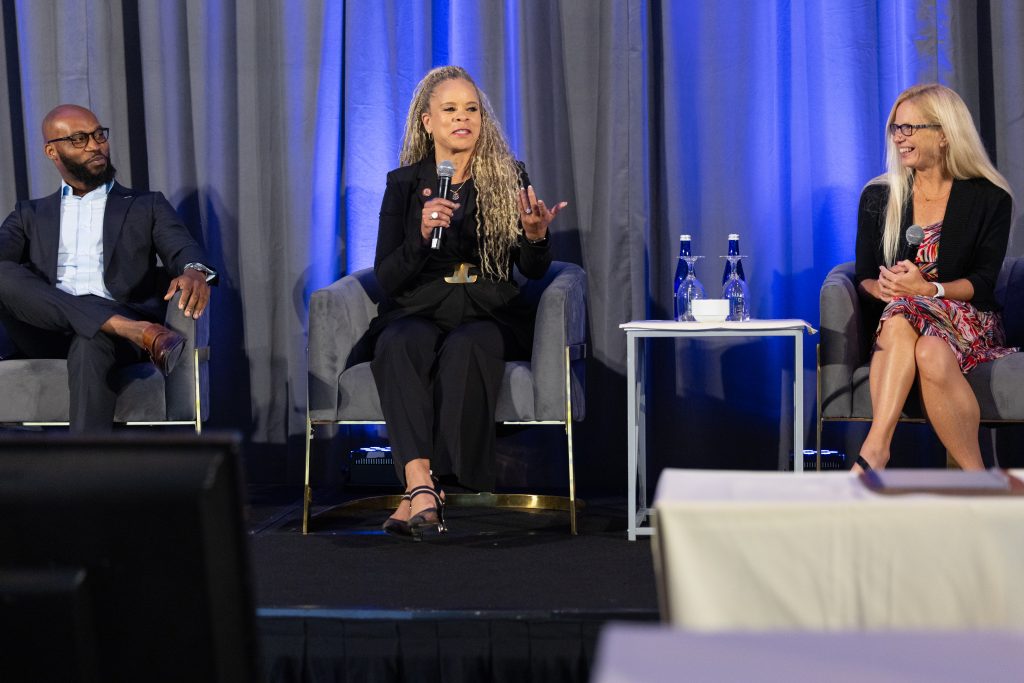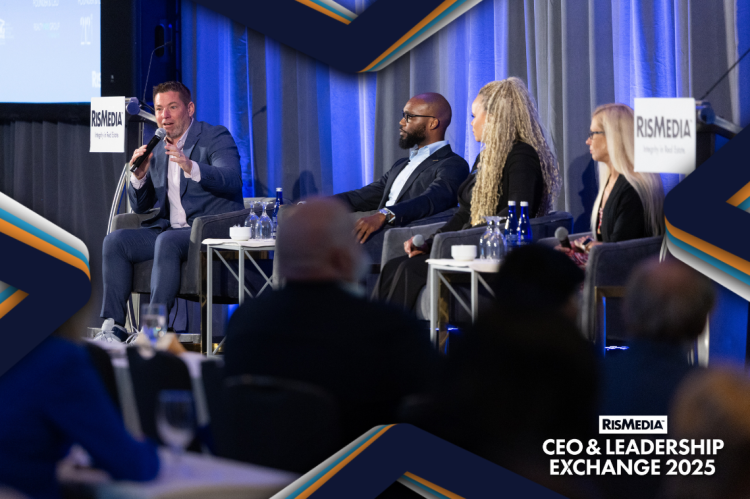Above, from left: Donny Samson, Adrian Provost, Melanie Gamble and Renee Gonzales. Photo by AJ Canaria.
The real estate industry is coming up on two years post-Burnett trial, and just over one year post practice changes and the conversations around buyer agency definitely haven’t slowed down.
In the new normal of late, the topic of buyer agents remains one of the most important to discuss in order to continue learning and evolving, especially as the industry settles into mandatory buyer representation agreements after a long year of change and growth.
This is what industry experts took to the stage to talk about during the panel “Buyer Agency Now: What’s Worked, What Hasn’t” at RISMedia’s recent CEO & Leadership Exchange earlier this month
Moderated by Justin Bailey, CEO of Realty Executives Associates, and featuring panelists Adrian Provost, founder and CEO of Realty ONE Group Terminus – Atlanta; Donny Samson, CEO of Samson Properties; Melanie Gamble, founder and CEO of 212 Degrees Realty; and Renee Gonzales, CEO of Long Realty Company discussed what buyer agency strategies are emerging as successful—and which have backfired.
Diving in, Bailey asked panelists the big question: how have the industry changes impacted buyer agents’ businesses, and by extension their brokerages overall?
Samson opened the discussion by noting that the transition and educating agents did produce some confusion, especially with different rules in different areas and states, but once people began to adjust to the new normal things were on the up.
“There’s been a lot of opportunities from it…a lot of our agents are making more money than they ever made before,” he said. “I think being able to dictate their own price point and their own value and ask for that as part of the contract/deal has been really eye opening and exciting for some of our agents when they wrap their heads around it.”
One of the largest concerns across the industry has been over the potential for more buyers going unrepresented due to not understanding the value of an agent.
Samson addressed this, saying that with education and preparation agents have been able to advocate for themselves better than before.
“I think that the client experience for those that have done the buyer consultation, seen the value, talked to the buyers, I think it’s much better,” he said. “It’s more transparent, it’s more clear.”
Provost added to this by noting that having to shift their business and really demonstrate their value proposition has forced a lot of agents to a higher level of professionalism. As Provost put it, buyer agency “forces (agents) to be more of an expert to offer more value.”
Gamble agreed with this as well, adding that “the barrier to entry is way too low in our industry” and having more professionalism and adding a bit more challenge to the job will only create better agents.
 Gonzales affirmed that buyer agency has “been something that our buyers now know what they’re getting and our agents are doing a better job of representing the buyer.”
Gonzales affirmed that buyer agency has “been something that our buyers now know what they’re getting and our agents are doing a better job of representing the buyer.”
“We all looked at this and thought that this was going to change our world. Well, it did change our world, but I believe it changed our world for the better,” she continued.
Samson and Gonzales also noted that as the industry continues to evolve, so should the requirements to become an agent. Both said that licensing requirements in many states are not up to par on what an agent should know and be able to do when they enter the business.
“You should be learning the contract, learning what a good listing presentation is, learning what a good buyer presentation is. You should have to pass those things,” said Samson.
Gonzales added that “up until recently an appraiser had to have a college degree to appraise a house, but you only had to have a high school diploma to actually sell a house,” saying that is a “huge disparity” that needs to be addressed.
At the end of the day, everyone agreed that this business of real estate always has been and always will be a relationship business.
“What is going to keep this profession solid forever, what makes us different is this: the relationships, the trust,” said Samson. “They want a trusted person next to them in the biggest financial decision of their life.”
Gamble rounded it out by adding that the focus has always been community.
“Being community focused I’ve always had my agents be relational with their clients from day one,” she explained. “It’s not about the transaction because if you have that relationship, you’ll get a thousand transactions after that. It’s just all about having that relationship.”












